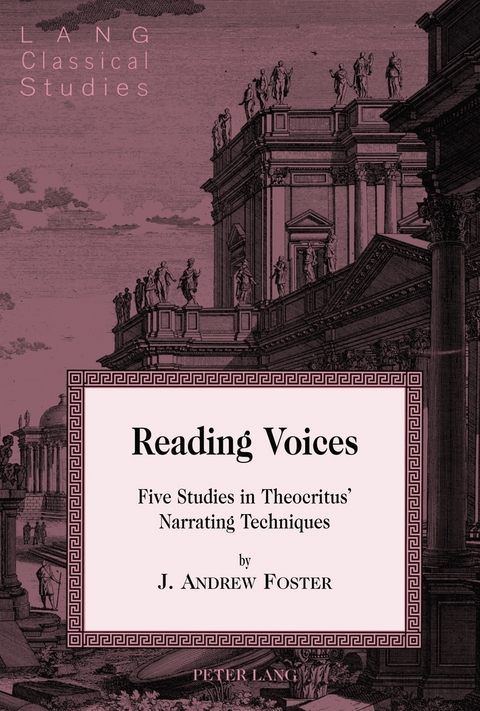
Reading Voices
Five Studies in Theocritus’ Narrating Techniques
Seiten
2016
|
New edition
Peter Lang Publishing Inc (Verlag)
978-1-4331-3249-0 (ISBN)
Peter Lang Publishing Inc (Verlag)
978-1-4331-3249-0 (ISBN)
This book is a study of Theocritus’ narrating techniques, intertextual practices, and the relationship between them. J. Andrew Foster provides detailed readings of these specific poems, demonstrating how each poem’s narrative structure and its intratextual and intertextual affiliations interact to characterize the voices and audiences expressed and imagined by the discourse.
This book is a study of Theocritus’ narrating techniques, intertextual practices, and the relationship between them. By a close, careful description and analysis of these features as particularly deployed in Idylls 6, 11, 13, 24, and 15, J. Andrew Foster provides detailed readings of these specific poems, demonstrating how each poem’s narrative structure and its intratextual and intertextual affiliations interact to characterize the voices and audiences expressed and imagined by the discourse. Within these poems Theocritus especially orchestrates polyphonic voices speaking to diverse fictional, ideal, and actual audiences and so authorizes a range of responses to speech-in-text. His densely allusive poems exhibit an iterative aspect and resistance to closure that particularly encourage his readers to help compose larger metanarratives in which such resolution can be achieved or the particular episode can be better understood. The interplay between the referential systems inscribed within these poems and their rhetorical structure exemplifies how Theocritus encourages his poetry to be incorporated into a wider literary discourse by which that wider literary landscape is transformed. Within these experiments in narration and reception, Theocritus exhibits an intense engagement with the literary past and his critical present whose receptions and authority are continually problematized. These readings will serve as a springboard into the wider ongoing study of the problems of poetic voice, authority, and literary innovation within Theocritus’ poetry in particular and Hellenistic poetry in general.
This book is a study of Theocritus’ narrating techniques, intertextual practices, and the relationship between them. By a close, careful description and analysis of these features as particularly deployed in Idylls 6, 11, 13, 24, and 15, J. Andrew Foster provides detailed readings of these specific poems, demonstrating how each poem’s narrative structure and its intratextual and intertextual affiliations interact to characterize the voices and audiences expressed and imagined by the discourse. Within these poems Theocritus especially orchestrates polyphonic voices speaking to diverse fictional, ideal, and actual audiences and so authorizes a range of responses to speech-in-text. His densely allusive poems exhibit an iterative aspect and resistance to closure that particularly encourage his readers to help compose larger metanarratives in which such resolution can be achieved or the particular episode can be better understood. The interplay between the referential systems inscribed within these poems and their rhetorical structure exemplifies how Theocritus encourages his poetry to be incorporated into a wider literary discourse by which that wider literary landscape is transformed. Within these experiments in narration and reception, Theocritus exhibits an intense engagement with the literary past and his critical present whose receptions and authority are continually problematized. These readings will serve as a springboard into the wider ongoing study of the problems of poetic voice, authority, and literary innovation within Theocritus’ poetry in particular and Hellenistic poetry in general.
J. Andrew Foster is Assistant Professor of Classics at Fordham University. He has written several articles and reviews on a wide variety of Classical subjects including Theocritus, Apollonius of Rhodes, Hellenistic poetry, and Platonic dialog. He is also co-author with Kathryn Kueny of a study of the bee as a religious symbol in Antiquity.
Contents: Introduction: Text, Voice, and Audience – Situational Incongruities: Narrators and Audiences in Idyll 6 – Poet and Metapoesis in Idyll 11 – Herakles the Sympotic Argonaut: Allusion, Emulation, and Narrative Innovation in Idyll 13 – Nemean 1 and Idyll 24: The Poetics of Heroic – Arsinoe as Epic Queen: Hosts, Hospitality, and Their «Reception» in Idyll 15 – Conclusion: Voices Heard and Read.
| Erscheinungsdatum | 05.02.2016 |
|---|---|
| Reihe/Serie | Lang Classical Studies ; 21 | Lang Classical Studies ; 21 |
| Verlagsort | New York |
| Sprache | englisch |
| Maße | 150 x 225 mm |
| Gewicht | 510 g |
| Themenwelt | Geisteswissenschaften ► Sprach- / Literaturwissenschaft ► Anglistik / Amerikanistik |
| Geisteswissenschaften ► Sprach- / Literaturwissenschaft ► Latein / Altgriechisch | |
| Geisteswissenschaften ► Sprach- / Literaturwissenschaft ► Literaturwissenschaft | |
| ISBN-10 | 1-4331-3249-4 / 1433132494 |
| ISBN-13 | 978-1-4331-3249-0 / 9781433132490 |
| Zustand | Neuware |
| Haben Sie eine Frage zum Produkt? |
Mehr entdecken
aus dem Bereich
aus dem Bereich
Poetik eines sozialen Urteils
Buch | Hardcover (2023)
De Gruyter (Verlag)
59,95 €
Buch | Softcover (2024)
belleville (Verlag)
20,00 €


